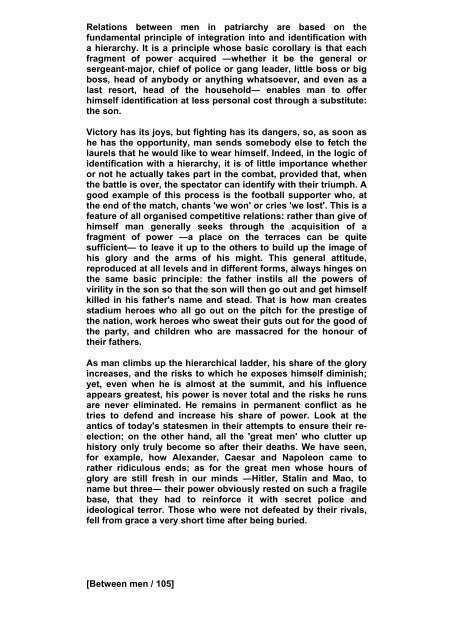emmanuel reynaud holy virility the social construction of masculinity
emmanuel reynaud holy virility the social construction of masculinity
emmanuel reynaud holy virility the social construction of masculinity
You also want an ePaper? Increase the reach of your titles
YUMPU automatically turns print PDFs into web optimized ePapers that Google loves.
Relations between men in patriarchy are based on <strong>the</strong><br />
fundamental principle <strong>of</strong> integration into and identification with<br />
a hierarchy. It is a principle whose basic corollary is that each<br />
fragment <strong>of</strong> power acquired ―whe<strong>the</strong>r it be <strong>the</strong> general or<br />
sergeant-major, chief <strong>of</strong> police or gang leader, little boss or big<br />
boss, head <strong>of</strong> anybody or anything whatsoever, and even as a<br />
last resort, head <strong>of</strong> <strong>the</strong> household― enables man to <strong>of</strong>fer<br />
himself identification at less personal cost through a substitute:<br />
<strong>the</strong> son.<br />
Victory has its joys, but fighting has its dangers, so, as soon as<br />
he has <strong>the</strong> opportunity, man sends somebody else to fetch <strong>the</strong><br />
laurels that he would like to wear himself. Indeed, in <strong>the</strong> logic <strong>of</strong><br />
identification with a hierarchy, it is <strong>of</strong> little importance whe<strong>the</strong>r<br />
or not he actually takes part in <strong>the</strong> combat, provided that, when<br />
<strong>the</strong> battle is over, <strong>the</strong> spectator can identify with <strong>the</strong>ir triumph. A<br />
good example <strong>of</strong> this process is <strong>the</strong> football supporter who, at<br />
<strong>the</strong> end <strong>of</strong> <strong>the</strong> match, chants 'we won' or cries 'we lost'. This is a<br />
feature <strong>of</strong> all organised competitive relations: ra<strong>the</strong>r than give <strong>of</strong><br />
himself man generally seeks through <strong>the</strong> acquisition <strong>of</strong> a<br />
fragment <strong>of</strong> power ―a place on <strong>the</strong> terraces can be quite<br />
sufficient― to leave it up to <strong>the</strong> o<strong>the</strong>rs to build up <strong>the</strong> image <strong>of</strong><br />
his glory and <strong>the</strong> arms <strong>of</strong> his might. This general attitude,<br />
reproduced at all levels and in different forms, always hinges on<br />
<strong>the</strong> same basic principle: <strong>the</strong> fa<strong>the</strong>r instils all <strong>the</strong> powers <strong>of</strong><br />
<strong>virility</strong> in <strong>the</strong> son so that <strong>the</strong> son will <strong>the</strong>n go out and get himself<br />
killed in his fa<strong>the</strong>r's name and stead. That is how man creates<br />
stadium heroes who all go out on <strong>the</strong> pitch for <strong>the</strong> prestige <strong>of</strong><br />
<strong>the</strong> nation, work heroes who sweat <strong>the</strong>ir guts out for <strong>the</strong> good <strong>of</strong><br />
<strong>the</strong> party, and children who are massacred for <strong>the</strong> honour <strong>of</strong><br />
<strong>the</strong>ir fa<strong>the</strong>rs.<br />
As man climbs up <strong>the</strong> hierarchical ladder, his share <strong>of</strong> <strong>the</strong> glory<br />
increases, and <strong>the</strong> risks to which he exposes himself diminish;<br />
yet, even when he is almost at <strong>the</strong> summit, and his influence<br />
appears greatest, his power is never total and <strong>the</strong> risks he runs<br />
are never eliminated. He remains in permanent conflict as he<br />
tries to defend and increase his share <strong>of</strong> power. Look at <strong>the</strong><br />
antics <strong>of</strong> today's statesmen in <strong>the</strong>ir attempts to ensure <strong>the</strong>ir reelection;<br />
on <strong>the</strong> o<strong>the</strong>r hand, all <strong>the</strong> 'great men' who clutter up<br />
history only truly become so after <strong>the</strong>ir deaths. We have seen,<br />
for example, how Alexander, Caesar and Napoleon came to<br />
ra<strong>the</strong>r ridiculous ends; as for <strong>the</strong> great men whose hours <strong>of</strong><br />
glory are still fresh in our minds ―Hitler, Stalin and Mao, to<br />
name but three― <strong>the</strong>ir power obviously rested on such a fragile<br />
base, that <strong>the</strong>y had to reinforce it with secret police and<br />
ideological terror. Those who were not defeated by <strong>the</strong>ir rivals,<br />
fell from grace a very short time after being buried.<br />
[Between men / 105]
















